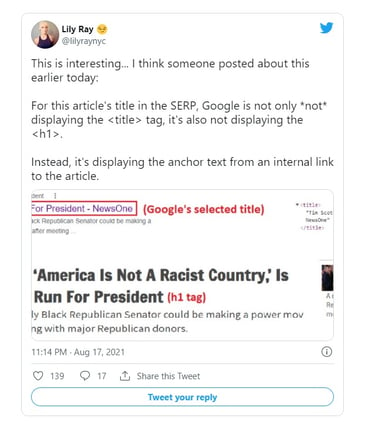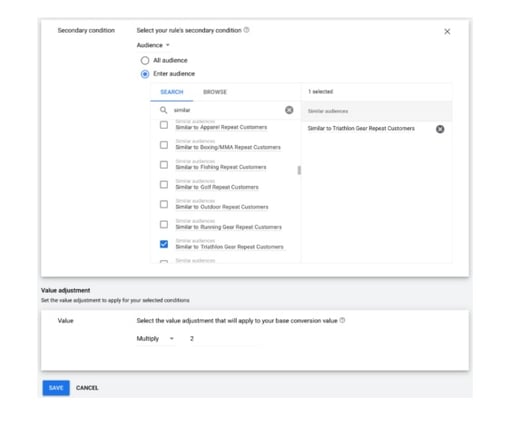How to Protect SEO Performance During a Site Migration
Arming yourself with the right tools to ensure a smooth site migration is important - find out how to protect your SEO during a migration today.
Read moreSEO wiz Luke Tilston is here with an update on all things SEO this week, including changes to title tags in SERPs, ad conversion value rules and more. Read more.
In this week's SEO News Round-up, we take a look at Google rewriting title tags, new Google Ad conversion value rules and Facebook's first ever report on most-viewed content.
Google appears to be rewriting title tags for specific pages in search results - often replacing the text with the page's H1 tag.
Google has been known to adjust titles in SERPs by making occasional small tweaks such as appending a brand name to the end, however, it now appears Google are going an extra step further and overriding titles with completely different text.
The SEO community started taking notice of these changes on August 16th, as tweets started to appear mentioning a "massive" title rewrite on Google. At this point in time, it's hard to tell the magnitude of the supposed rewrites, however it has been widespread enough for multiple people to pick up on it.

Evidence is suggesting that Google is pulling in text from H1 tags for a majority of these, however others have stated they have seen Google replace a page's title with anchor text from an internal link.
It appears that Google may simply choose to grab any relevant text from a page and display it as the title in SERPs. This has long been the case with meta descriptions with Google just dynamically adjusting the description in search snippets to more accurately match a users query.
What does this mean for SEOs?
Its hard to draw any meaningful conclusions regarding Google rewriting title tags at this point in time. Google are known to run A/B tests in live search results and its entirely possible that this is what were seeing with title tags right now and the changes will revert back to normal in the near future.
However this may be the initial stages of a larger more permanent change. Assuming that this is how Google will handle titles in search snippets going forward it could actually end up being a good thing for websites.
The apparent goal of replacing titles is to enhance the relevancy for searchers and if that’s the case a more relevant title could be more compelling to click on.
Regarding any concerns SEOs may have with this update guidance from Google’s John Mueller states that titles are important but are not worth stressing over.

Its important to recognise that at this stage there haven’t been any reported drops in rankings for rages with rewritten tittles which is a good indicator that the change will not impact SEO’s negatively however it will be important to keep track of this change going forward.
Conversion value rules allow advertisers to tell Google ads what factors are most important to them by applying rules.
These rules then allow advertisers to indicate situations when a conversion is worth more or less than the average conversion based on various characteristics of the auction. Having this control will now allow advertisers and start bidding algorithms to use more accurate data to bid and budget more effectively.
What factors can advertisers choose from when applying rules?
Advertisers can apply rules based on characteristics such as location, device and audiences.
Example conversion rule scenario
A certain device tends to drive a high volume of leads however fails at converting from lead to sale. An advertiser could set up a conversion rules to tell google that those conversions are only worth half that of the current value set for the campaign.
Once the account is set up to value all conversions at £20. If mobile leads tend to convert to sales at conversion rate of 50% of that of desktop a conversion rules could be put into place that lets Google know that mobile leads are worth only half the value of other leads. Google would then use a £10 value for mobile searches whilst continuing to optimise all other searched for a £20 value.
Conversion value reporting
You can report on conversion value rules by using the segment tool on the campaign tab. From there you are able to select conversions then value rules adjustment. From there you are able to choose one of the following segment options:
Facebook published a report that offers a first ever insight into what content gets the most views on peoples news feeds.
The report published on the 18th August is the first in a series of reports that focuses on domains, links, pages and posts that gets the most views in the US.
A view is counted when a content appears on a users screen for any length of time and a user does not need to have engaged with the content for it to count as a view.
Facebook have said that the goal of the first quarterly report is to provide clarity around what people are seeing in their newsfeeds.
General takeaways:
Most viewed domains:
Facebook’s full report contains a list of the top 20 domains by content views. In the interest of brevity, here’s a look at the top five.
Most viewed links:
Again, Facebook’s report has a list of the top 20 links. Here’s a snapshot of the top five.
The general reaction to Facebook's report have not been favorable.
In an article recently circulating twitter, Ethan Zuckerman gives a harsh critique of the report claiming it doesn’t provide any useful data or tell us anything of value.
Although the value of the report has been brought into question if nothing else it is interesting to gain a greater insight into the amount of views a page can generate with a simple text post.
And that brings us to the end of our SEO news round-up. If you'd like to ask any questions about any of the news, please don't hesitate to get in touch.
More articles you might be interested in:

Arming yourself with the right tools to ensure a smooth site migration is important - find out how to protect your SEO during a migration today.
Read more
Google employees have recently announced that the upcoming Google Core Update is set to be released in the coming weeks. Understanding and addressing...
Read more
Language matters. Any marketer worth their salt knows this. But when discussing gender and sexual orientation, that importance is amplified tenfold.
Read more
When marketers think of thought leadership, there are names rather than ideas, that tend to spring to mind.
Read more
As Google turns 25, we’re taking a look back at our favourite Google moments. Which features have made the biggest impact on digital marketing on...
Read more
Join Olivia and Stef as they speak to social media specialist Ed about Threads, Twitter's evolution and the future of being social digitally.
Read more
With the release of GPT-4, how revolutionary will this tool be? Alan Rowe takes us through it...
Read more
To help prompt you to consider your approach to organic search integration, Dr. Dave Chaffey gives some practical tests you can apply to review your...
Read more